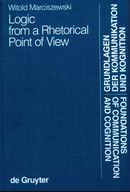 LEMUS
LEMUS LECTORIUM
 LEMUS
LEMUS
A PROJECT FOR ECTS -
European Credit Transfer System
The chapters as listed below are selected
from the mentioned volume, with kind permission of the Publisher (his letter
of 24 January, 2005). These are to assist study of logic.
The main plot of the book is the feedbak between two
processes: the reasonings being verbalized, symbolic, some of them even
formalized (algorithmized), and the reasonings unverbalized, intuitive, even
not fully conscious. The latter are supposed (John von Neumann's
inspiration) to be a function of neural code, here called (Ch.7) the
internal logical code in human bodies. The former is the subject matter
of symbolic logic, hence a fairly extensive exposition of Logic, and also
(in Leibniz's spirit) of Artifical Intelligence (Ch.7 and 8); these parts
are reproduced here in electronic form.
The remaining chapters (omitted here: 1, 2, 3, 9, 10, and
Postscript) deal with the said feedback as essential in rhetorical activity.
Speaker's or writer's efficient acting upon an audience requires a clever
combination of the both kinds of means, those being symbolic, including
symbolic logic, and those operating beyond langauge. Just in this way, if we
wish to influence the minds of other people, we can try to match the
enormous complexity of mental phenomena -- as ingeniously noticed by Blaise
Pascal (his idea of esprit de finesse), being the hero of Chapter
One. The selected chapters:
NOTE. In the Postsript, on-line readers' contact with
the author is suggested but, unfortunately, both the method and the adress
are for long out of date. The current data are as follows:
(part of Erasmus programme).
by Witold Marciszewski
Logic from a Rhetorical Point of View
Walter de Gruyter, Berlin / New York, 1994

home page: www.calculemus.org
e-mail: witmar@calculemus.org
Witold Marciszewski